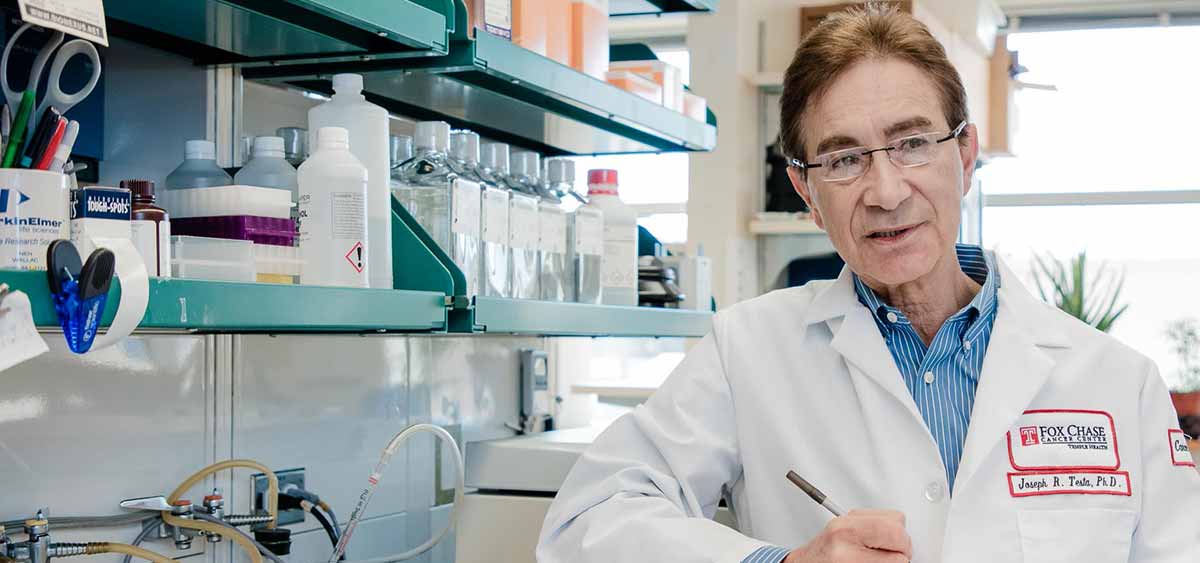
PHILADELPHIA (June 14, 2019) – Researchers at Fox Chase Cancer Center have found that the combined loss of function of three genes commonly associated with pleural malignant mesothelioma – Bap1, Nf2, Cdkn2a – contributed to rapid and aggressive development of the disease in an animal study.
Malignant mesothelioma is a disease commonly diagnosed in people with asbestos exposure. However, in some cases people are born with familial or inherited mutations to the Bap1 tumor suppressor gene. Presence of such Bap1 mutations can cause a person to be susceptible to malignant mesothelioma, as well as other cancers.
“Unlike many other types of cancer where a person might have dozens of different genetic alterations, in both hereditary and non-hereditary mesotheliomas, Bap1, Nf2, and Cdkn2a are by far the most common gene alterations and are considered genetic ‘drivers’ of these tumors,” said Joseph R. Testa, PhD, FACMG, professor and Carol and Kenneth E. Weg Chair of Human Genetics at Fox Chase.
In humans, about 80 percent of mesotheliomas have at least one of these genes involved, and almost 40 percent have all three genes altered.
Testa and colleagues conducted experiments to test what happened in mouse models where one, two, or three of these genes were deleted or ‘knocked out’.
The paper, “Inactivation of Bap1 Cooperates with Losses of Nf2 and Cdkn2a to Drive the Development of Pleural Malignant Mesothelioma in Conditional Mouse Models,” was published in the journal Cancer Research, a journal of the American Association for Cancer Research.
Deletion of each of the three genes individually resulted in few or no cases of malignant mesothelioma in the mouse models. When deletion of Bap1 was combined with deletion of either Nf2 or Cdkn2a development of malignant mesothelioma occurred in about 20 percent of knockout mice.
However, when Bap1, Nf2, and Cdkn2a were all deleted – triple knockout – the incidence of mesothelioma increased to 85 percent.
“When these tumors had all three genes knocked out, they developed two to three times faster and were always high grade and very invasive,” Testa said.
The triple knockout mice had a median survival of only 12 weeks. Moreover, the investigators discovered that deletion of Bap1 contributed to mesothelioma development, in part, by promoting EZH2/PRC2-mediated expression of oncogenes and pro-invasive target genes.
To see if the findings in the mouse study were similar in humans, one of study’s co-authors, Suraj Peri, PhD, also of Fox Chase, analyzed data from The Cancer Genome Atlas (TCGA) and found that mesothelioma patients whose tumors had alterations of all three genes had a very poor survival outlook.
In addition, previous research has demonstrated that Bap1 inactivation can lead to EZH2-dependent transformation, and a phase 2 study testing an EZH2 inhibitor showed promising antitumor activity in malignant mesotheliomas with Bap1 inactivation.
“This research indicates that alterations of these three genes can serve as a biomarker of response to EZH2 inhibitors. Patient selection based on these three genetic alterations could enrich the trial population and possibly improve the impact of these inhibitors in the clinic,” said Hossein Borghaei, DO, MS, professor and chief of Thoracic Oncology at Fox Chase, who was not involved in the study.
This discovery opens up avenues for research into prevention and new therapies for mesothelioma, because the triple knockout mouse model can be used to test new drugs. Testa said this knockout mouse model will be made readily available to any scientist around the world who might want it. In addition to investigators at Fox Chase, another key contributor was Frank J. Rauscher III, PhD, whose laboratory at the Wistar Institute first isolated the Bap1 gene in 1998.
This work was supported by NCI Grant CA175691 to Fox Chase and the Wistar Institute as well as NCI Grant CA06927, and an appropriation from the Commonwealth of Pennsylvania to Fox Chase Cancer Center. Other support was provided by the Local #14 Mesothelioma Fund of the International Association of Heat and Frost Insulators and Allied Workers.